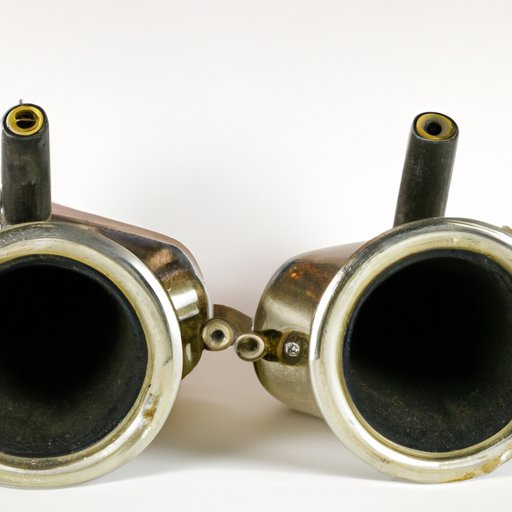
Introduction
As a vehicle owner, you may have heard about the significance of a catalytic converter, but may still have questions. The catalytic converter is an essential component for your car’s exhaust system, which helps to minimize the environmental impact of your vehicle on the air quality. In this article, we will explore the role of a catalytic converter and whether you need one for your car. Additionally, we will discuss the financial, environmental, and legal implications of not having one and offer some tips on how to maintain it.
The Role of a Catalytic Converter: Do You Need One For Your Car?
A catalyst converter is designed to reduce harmful emissions from the exhaust of gasoline and diesel-powered vehicles. It is a small, honeycomb-shaped device that is placed in the exhaust system of your car. The converter helps to convert harmful pollutants, such as carbon monoxide, nitrogen oxide, and hydrocarbons, into less harmful byproducts, such as carbon dioxide and water vapor, before they exit the tailpipe of your car and into the environment.
Most cars on the road today are required to have a catalytic converter by law. If your car was manufactured after 1975, chances are it came with a catalytic converter already installed. However, some rare classic cars or vehicles driven solely for motorsports may not require one. It’s vital to check with your manufacturer or mechanic to ensure whether your vehicle needs a catalyst converter or not.
How a Catalytic Converter Impacts Your Budget and the Environment
The catalytic converter can help you save money in the long run by reducing the amount of fuel that your car consumes. This can increase your car’s fuel efficiency, which saves you money at the gas pump, and reduces carbon emissions, which benefits the environment. Moreover, by keeping your converter in good condition, you can avoid expensive repairs down the line.
Conversely, if you don’t have a catalytic converter installed or your converter is faulty, it can directly affect your wallet and the environment. Not only will your vehicle emit harmful pollutants that negatively impact the environment, but it will also fail your state, province, or country’s emission testing, leading to, as per the regulations, steep penalties and fines.
What You Need to Know About Catalytic Converter Laws and Regulations
If your vehicle requires a catalytic converter, it is essential to know about the laws and regulations in your territory. For instance, in the United States, it is illegal to sell, use, or install used catalytic converters due to environmental concerns. Laws like the California Catalytic Converter Law mandate that replacement converters must meet certain criteria for compatibility and emissions standards. You could face steep fines, penalties, and, in some cases, impounding of your vehicle if your car doesn’t comply with the regulations.
Therefore, it’s a good idea to be up-to-date on any legal requirements and to consult your mechanic regarding the installation of a new one. Car manufacturers usually manufacture their catalytic converters to meet legal requirements and guarantee their performance, making them a good choice over aftermarket converters that may not be compatible or effective.
To Remove or Not to Remove: The Pros and Cons of Taking Out Your Catalytic Converter
Though some car enthusiasts and racers may consider removing their catalytic converters to improve the performance of their vehicles, it’s not a good practice. The benefits are not worth the risks. Here’s why:
Pros of Removing a Catalytic Converter
- Removal can slightly improve engine performance by reducing backpressure in the exhaust system.
- Removing a catalytic converter reduces the weight of the vehicle very slightly.
- There are no significant benefits of removing it besides the two mentioned above.
Cons of Removing a Catalytic Converter
- Removing your converter will make your vehicle fail emission tests or make it illegal on the roadways.
- You could face hefty fines or penalties and, in some cases, impounded and even square off criminal charges.
- Removing a converter will increase the pollution that your car generates, which is harmful to both the environment and public health.
- The check engine light may come on and alert you to the missing converter.
Catalytic Converters: The Essential Component of Your Car’s Exhaust System?
Along with mufflers and exhaust pipes, catalytic converters are an essential part of your car’s exhaust system. Being the essential component, it’s essential to keep it in good condition. Here are some tips on how to maintain an effective converter and reduce the chances of having a broken one:
- Check your car owner’s manual for specific maintenance schedules that are best suited for your car model.
- Take your vehicle to a certified mechanic for routine maintenance and inspections as prescribed by your manufacturer.
- Use gasoline free of ethanol or choose high-quality fuel rated for your vehicle.
- Stay alert to changes in your engine performance and be sure to respond to changes in the check engine light as soon as possible.
If you believe your engine’s performance has suffered, or notice poor gas mileage or odd engine noise, it may indicate a problem with your converter. It is vital to get it checked out to avoid costly damages further down the line.
Conclusion
In conclusion, the catalytic converter is an integral part of your car’s exhaust system and benefits our environment by minimizing harmful emissions. While laws and regulations of the area mandate them in vehicles for safety measures, it’s important to choose a certified mechanic to install them. Removing a catalytic converter is illegal, harmful, and often unnecessary. It is always best to maintain a healthy converter than risking removing it. So, it’s best if you check with your manufacturer or mechanic before deciding, as they will be in a better position to advise you. By following these guidelines, you can avoid hefty fines and the impact of harmful pollutants from your vehicle.





